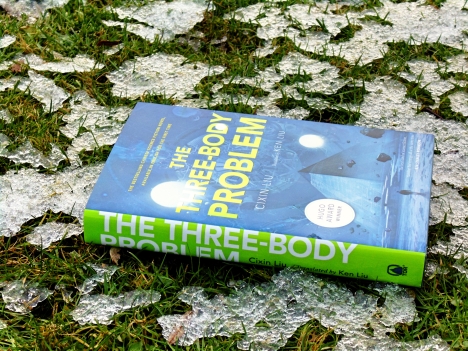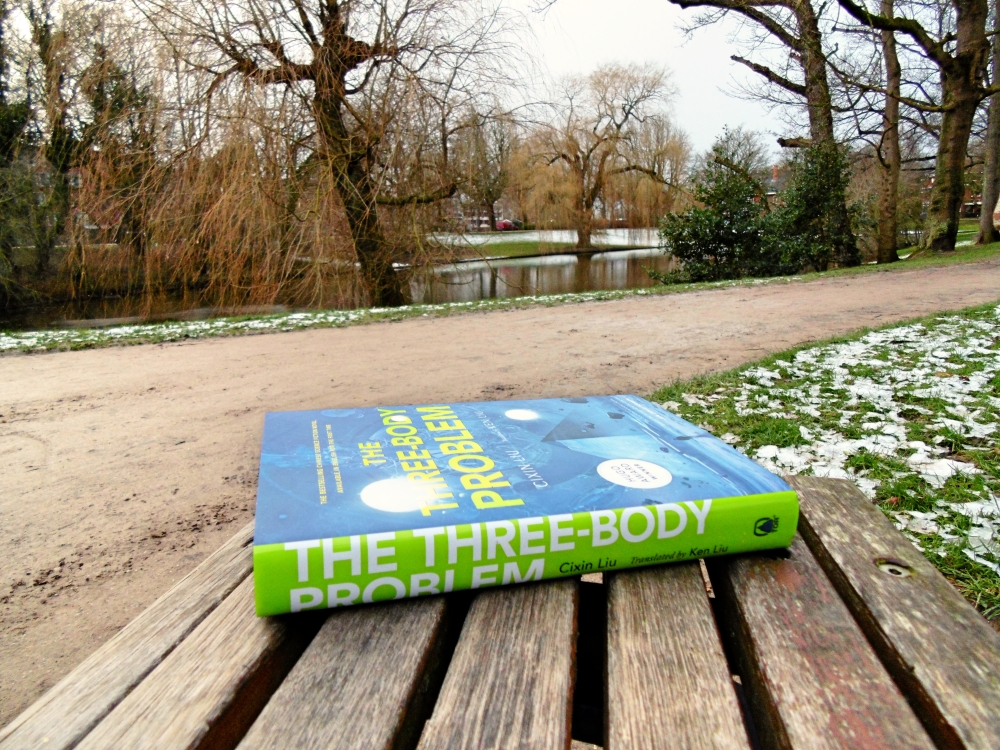 The Three-Body Problem by Liu Cixin
The Three-Body Problem by Liu Cixin
My rating: 3.5 of 5 stars
Book synopsis:
Starting in China, in 1967, a young, brilliant woman’s life is forever changed. Ye Wenjie is witness to her father’s public torture and death under the accusation of being a Reactionist. The impact of this traumatic event won’t show until two years later when Ye Wenjie ends up at the Red Coast Base. There she is asked to dive deep into important research with no idea of exactly what project she is working on. Her experiments will eventually lead her to a position of great power with unfathomable implications to the fate of humanity.
Many decades later, a nanophysicist named Weng Miao, is approached and asked to help investigate the sudden, inexplicable wave of suicides of renowned physicists working for an organisation called the Frontiers of Science. Weng is asked to join the organisation to help solve the mystery of the deaths from the inside. He ends up taking part in an online game which invites players to ponder upon the much discussed Three-Body Problem. Through the game, he comes in contact with Ye Wenjie and the horrifying secret that she has been hiding for many years is finally revealed to the world.

Allow me to begin this review with a few words about the importance of this novel in the literary community. The Three-Body Problem not only holds the prestigious Hugo Award of 2014 for best novel but has gained incredible recognition and appreciation from the Chinese reading community. Liu Cixin’s background in physics and mathematics is evident as much as his love for science is distilled inside the pages of his hard science fiction novel. The Three-Body Problem sets the stage for the Remembrance of Earth’s Past trilogy which has been successfully translated and become available for the Western world to enjoy.
“In China, any idea that dared to take flight would only crash back to the ground. The gravity of reality is too strong.”
 Constructing a comprehensive and proper critique of this novel is a difficult task, as it constitutes a new, unprecedented problem for me as a book reviewer. The Three-Body Problem is both excellent and extremely lacking. This is a plot-heavy novel. The sequence of events and the happenings that are arranged inside the two covers of this book narrate a fascinating story. This story is based on scientific knowledge and is organised in a way that feels accessible to anyone with some basic understanding of physics. This is a hard SF novel. Similar to The Martian by Andy Weir, Liu Cixin makes vast use of laws of physics and somewhat complex scientific background to base his imaginative story. At the same time, it is apparent that Liu strives to make his novel accessible to readers who do not hold such a firm grasp and understanding of science and physics as he does. For me, that translated into an overal pleasant reading experience separated by a few paragraphs that went over my head but which were graciously summarised into one-sentence structures that provided the gist of what I had just missed. This is not a college lecture on molecular physics so I did not mind it.
Constructing a comprehensive and proper critique of this novel is a difficult task, as it constitutes a new, unprecedented problem for me as a book reviewer. The Three-Body Problem is both excellent and extremely lacking. This is a plot-heavy novel. The sequence of events and the happenings that are arranged inside the two covers of this book narrate a fascinating story. This story is based on scientific knowledge and is organised in a way that feels accessible to anyone with some basic understanding of physics. This is a hard SF novel. Similar to The Martian by Andy Weir, Liu Cixin makes vast use of laws of physics and somewhat complex scientific background to base his imaginative story. At the same time, it is apparent that Liu strives to make his novel accessible to readers who do not hold such a firm grasp and understanding of science and physics as he does. For me, that translated into an overal pleasant reading experience separated by a few paragraphs that went over my head but which were graciously summarised into one-sentence structures that provided the gist of what I had just missed. This is not a college lecture on molecular physics so I did not mind it.
All the evidence points to a single conclusion: Physics has never existed, and will never exist. I know what I’m doing is irresponsible. But I have no choice.
Every little ingredient that makes a not only comprehensive but also captivating and exciting plot exists in abundance in this novel. Liu has an incredible imagination and is able to precisely enumerate the steps that allow a reader to become familiar with a speculation that is not easily comprehended by one who does not causally ponder on matters of existence. This novel reads like an extremely alluring scientific report or an engrossing lecture from a talented professor. It did actually give me the same feeling I sometimes had during a few physics school classes that I was thoroughly enjoying when I was younger. Liu engages the reader to imagine with him the “what ifs…” of our past and present existence on this universe and to contemplate on hypotheticals and philosophical matters of humanity and the consequences of our being into this limitless world.
Could it be that every previous great disaster, including the two World Wars, was also the result of reaching the end of ghostly countdowns? Could it be that every time there was someone like me, who no one thought of, who bore the ultimate responsibility?
 But the richness and wealth of the plot are irreparably damaged by a severe lack in character presentation and development. Liu’s characters are all, like his sophons, two-dimensional. There is nothing connecting the reader to the protagonists or any of the other humans present in this book. Ye Wenjie is the only character that shows a hint of advancement and that is only because of the necessity of this development to the plot. Weng Miao, whom the reader follows through the majority of the novel, is a voiceless observer, completely lacking in personality, with the sole purpose of being the means, a lens if you please, through which the reader experiences the novel. He is basically there just for the sake of having someone there. Initially, this was severely confusing and off-putting for me. As a European reader, I am used to more character-heavy plots and I enjoy bonding and feeling for the people in the stories. This is where translation fails to adapt to another culture. It is not fair of me to expect an author to completely adjust his writing to fit my culture, but at the same time, the book felt extremely foreign in terms of its format. This unfamiliarity of mine with the more collectivistic Chinese culture interfered with my reading experience of this wonderful novel. This is both an issue of personal preference as much as an issue of cultural background.
But the richness and wealth of the plot are irreparably damaged by a severe lack in character presentation and development. Liu’s characters are all, like his sophons, two-dimensional. There is nothing connecting the reader to the protagonists or any of the other humans present in this book. Ye Wenjie is the only character that shows a hint of advancement and that is only because of the necessity of this development to the plot. Weng Miao, whom the reader follows through the majority of the novel, is a voiceless observer, completely lacking in personality, with the sole purpose of being the means, a lens if you please, through which the reader experiences the novel. He is basically there just for the sake of having someone there. Initially, this was severely confusing and off-putting for me. As a European reader, I am used to more character-heavy plots and I enjoy bonding and feeling for the people in the stories. This is where translation fails to adapt to another culture. It is not fair of me to expect an author to completely adjust his writing to fit my culture, but at the same time, the book felt extremely foreign in terms of its format. This unfamiliarity of mine with the more collectivistic Chinese culture interfered with my reading experience of this wonderful novel. This is both an issue of personal preference as much as an issue of cultural background.
In this gray life, a dream appeared especially colorful and bright. But one always awoke from a dream, just like the sun – which, though it would rise again, brought no fresh hope.
Overall, The Three-Body Problem is a book that I would passionately recommend to anyone who enjoys hard science fiction. Although the cultural void cannot be mended, Liu Cixin has conceived an enthralling work of speculation that I am so happy to have discovered. I am incredibly excited to watch the movie adaptation of this remarkable novel and to continue with the second installment of the trilogy soon.

I’m a BookDepository affiliate. If you want to buy a book online (free worldwide shipping) and you go through my links (below) I’ll get a small referral commission. Thank you very much for your support!
BookDepository: The Three-Body Problem
Find me on social media:

Sounds interesting to me because of the chinese stuff, but the physics stuff… not so appealing 🙂
LikeLike
It is hard science fiction so there is a lot of “physics stuff” that are overwhelming to most of us who are not too familiar with physics but I think it is meant to be a little overwhelming. The author also does explain everything so in the end we do understand most of it but it can be a tiring reading experience. Do you think you might enjoy reading it?
LikeLiked by 1 person
Well, i am technically into science (i am a programmer) but for some reason physics was not my best subject (marh was and the only chemistry I know is H2O). But since you say he explains in the end, I think I will read it. Chinese science fiction, too hard to pass.
LikeLike
I really enjoy physics (at least in school) but I hate programming! So I am cautiously recommending this one to you. I hope you’ll enjoy it 🙂
LikeLiked by 1 person